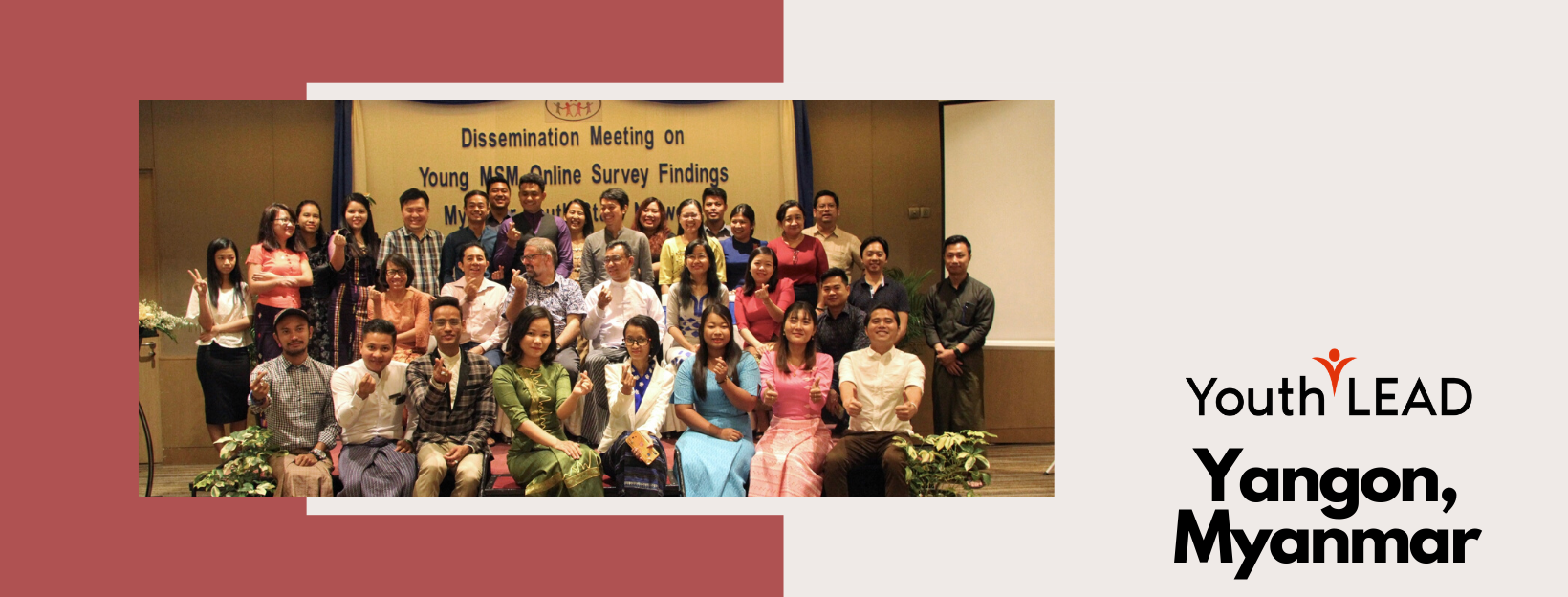Myanmar Youth Stars Leads Survey on YMSM

Myanmar Youth Stars leads first national survey on young MSM, initiates meeting on results in Yangon, Myanmar
Recently in Yangon, Myanmar Youth Stars (MYS) organised a dissemination meeting on the recently conducted survey on young men who have sex with men (YMSM) under the guidance and support from the National AIDS Programme (NAP) and in collaboration with CPI. The study was co-funded by CPI and Youth LEAD. This survey targeted young people ages 15 – 24 and was the first online survey to be given ethical approval by the Ethical Review Committee, University of Public Health, Yangon in Myanmar. MYS has partnered with APCOM to implement the PULSE UP Project, a community-led research and advocacy project that gathers information to improve access of young gay men to HIV services. MYS invited key stakeholders to this critical meeting to showcase the findings from the YMSM online survey on the 14th March 2020.
The dissemination meeting was joined by the Ministry of Health and Sports, National AIDS Programme and UN agencies which included UNAIDS Myanmar, UNAIDS RST and UNFPA Myanmar, Department of Medical Research, Save the Children, PSI, MSI, CPI, PGKand Alliance Myanmar. The meeting was welcomed by opening remarks from Dr Htun Nyunt Oo (NAP), Eamonn Murphy, Regional Director UNAIDS Asia and the Pacific and Dr Khaing Thandar, Program Director of the Strategy and Technical Unit, CPI. Dr Min Thet Phyo San, Network and Programme Coordinator and lead researcher, along with the MYS team, led the sessions and discussions throughout the day.
The primary outcome of the meeting was to disseminate the findings of the YMSM online survey in the form of advocacy messages, which would allow key stakeholders to understand the context behind the results. In turn, the advocacy messages would help translate a more practical approach to HIV programming for young people and key populations, especially in regards to implementing PrEP programs, and SRHR related programs.
The NAP recommended several approaches for strengthening services for YMSM, which included utilising the digital space and taking an online strategy for communicating HIV related information. The survey highlighted a lack of correlation between a young person's educational background and the level of HIV understanding, suggesting the program should target students of the same educational background, such as separating programs for high school students and university students. Additional recommendations from NAP also pushed for a peer-to-peer approach to HIV learning, citing previous success with the level of understanding on PrEP and adherence.
The online survey proved helpful in targeting socially hard-to-reach populations such as YMSM. The survey called attention to the need for addressing on-going high-risk sexual behaviour such as chemsex (high-fun), mental health problems and frequent unprotected anal intercourse. MYS collected the results and in summary, delivered a set of recommendations during the meeting, which included:
- Expanding HIV prevention programs that encompass harm reduction interventions and services;
- Strengthening HIV prevention programs on behavioural change interventions to reduce unsafe sexual practices;
- A need to address gaps in laws and policies, which includes more robust legal protections for transgender and non-binary people;
- Increase accessibility of PrEP services and information on the use of PrEP for YMSM by adopting peer-to-peer learning approach;
- Expanding HIV prevention services for YMSM with innovative methods such as social media prevention campaigns, test-and-treat campaigns and community-led services linking to care;
- Promote and develop life skills education training for adolescents;
- Target adolescents understanding of HIV and safe sexual practices and behaviours at an earlier age.
In the next steps, MYS will conduct a workshop for community members using the findings and results from the YMSM online survey. MYS will also advocate key findings with relevant stakeholders at the national and regional level and will seek support from potential donors to help strengthen capacity and advocacy initiatives targeting YMSM. MYS will take the recommendations provided by stakeholders and the online survey forward, and Youth LEAD will work closely to support MYS in their next steps.
To find out more about the YMSM Online Survey in Myanmar, contact Dr Min Thet Phyo San at mgtar88@gmail.com
Edited by: Dr Min Thet Phyo San (Network Programme Coordinator, Myanmar Youth Star) and Eddy Rudram (Communications Officer, Youth LEAD)

